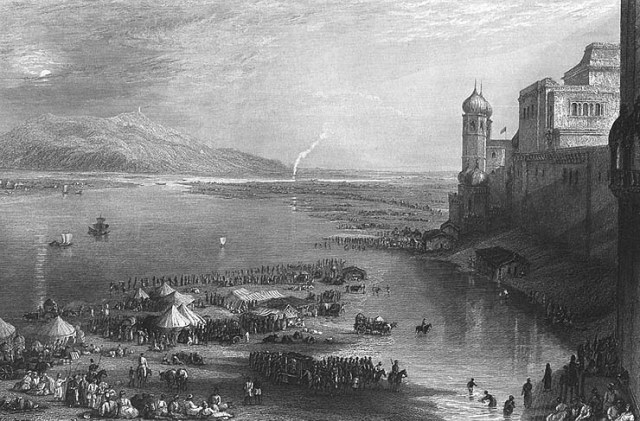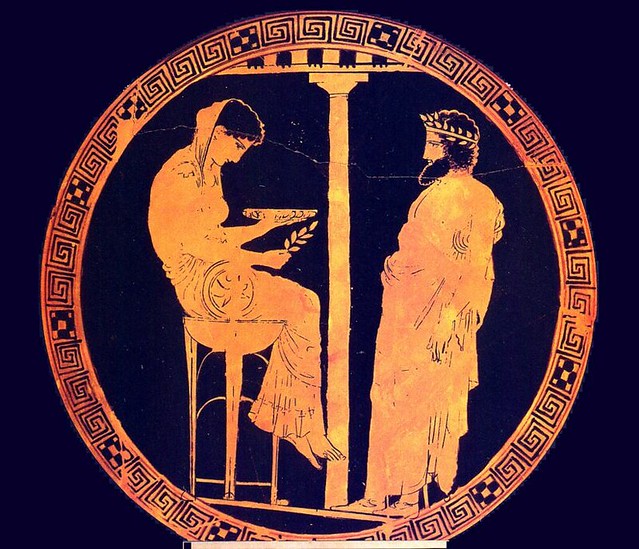
J.M.W. Tuner, “Haridwar Kumbh Mela”
“I do not know much about gods, but I think that the river is a strong brown god,” so begins the third of T.S. Eliot’s Four Quartets. The divinity of rivers has been recognized by all mythologies since the beginning of time. For the Egyptians, the androgynous god Hapi personified the Nile and was called the Lord of the River Bringing Vegetation. In Hinduism the river is the goddess Ganga – she is the spout of water rising from Shiva’s hair. The Kumbh Mela, the largest religious gathering in the world (over 120 million people), is held in four locations along the Ganges. The belief is that at these spots Vishnu spilt nectar of immortality from an urn, or kumbh. It was written in the Puranas: “Those who bathe in the bright waters of the Ganga where they meet the dark waters of the Yamuna during the month of Magh [roughly January/February] will not be reborn, even in thousands of years.”(quoted after The Guardian). The dates of celebrations are calculated according to the zodiacal positions of the Sun, the Moon and Jupiter. The incredible photos can be viewed here. Similarly, death and rebirth were also associated with rivers in Christian faith. Early Christians were baptized by total immersion in rivers, while in Judaism immersion is used as a rite of passage for converts.

Ganga and Shiva
Looking at the photos from India, one has to marvel at the symbolic power of the river, which stands for life itself, constantly changing, passing, flowing, moving forward, and yet somehow remaining the same – changing in time and timeless at the same time. Looking at a river, it is natural to fall into reverie and be transported to the other side of reality, like the dead were transported in Charon’s boat across the Styx.

John Roddam Spencer Stanhope, “Charon and Psyche”
William Wordsworth thus begins Book 9 of The Prelude:
“Even as a river,—partly (it might seem)
Yielding to old remembrances, and swayed
In part by fear to shape a way direct,
That would engulf him soon in the ravenous sea—
Turns, and will measure back his course, far back,
Seeking the very regions which he crossed
In his first outset; so have we, my Friend!
Turned and returned with intricate delay.”
Wordsworth’s words made me think of the famous Panta Rhei – yes, everything flows, but sometimes, like the river, we also meander, retracing our steps, revisiting the past, returning to the source.

Sebastião Salgado, the Eastern Part of the Brooks Range, Arctic National Wildlife Refuge, Alaska, USA,
In a famous photo by Sebastião Salgado, the river’s source is bathed in supernatural light. The first streams that will become the mighty river first quietly percolate among the lofty mountain peaks, hidden from view and growing in power. Origins of great civilizations are invariably bound to rivers. According to the Genesis story, there were four rivers that flowed out of Eden. As C.G. Jung explained in Mysterium Coniunctionis (par. 276):
“…because it was the abode of the originally androgynous Primordial Man (Adam), the Garden of Eden was a favourite mandala in Christian iconography, and is therefore a symbol of totality and—from the psychological point of view—of the self.”

A Turkish carpet depicting a walled garden with the Four Rivers of Paradise in the Museum of Islamic Arts, Istanbul
It seems that the combination of masculine and feminine characteristics informs the symbolism of rivers in many spiritual traditions. On the Theosophy Trust website the author draws attention to the etymology of the word:
”The name ‘river’ comes from rivus or rive, indicating ‘a splitting asunder,’ a process not only recorded in geological history but in mythology as well. For if the river literally divides the earth and creates the canyon depths, symbolically it divides the world of the living from that of the dead.”
Hence the ambivalence of the symbol – the river brings life but also reminds us of change leading to death. In his seminal work “Fundamental Symbols: The Universal Language of Sacred Science” Rene Guenon relates the Pilgrim’s Way to the symbolic river of life and death:
“The journey can be accomplished either by going upstream towards the source of the waters, or by crossing over the waters to the other shore, or by going downstream towards the sea.”
He then proceeds to discuss each type of symbolism. In the case of going upstream, the river is identical with the World Axis. The celestial river such as Ganga descends to the world from celestial realms; in this way “the influences of the ‘world above’ are transmitted to the ‘world below’.” The four rivers of Paradise had their source at the foot of the World Tree, which itself is synonymous with the World Axis that links heaven and earth. These four rivers “spread the celestial influences” that concentrated at the source into the whole world.
When it comes to the symbolism of crossing the river, it is conceived either as an important transformation or transition in life, as death, as mentioned before, or as reaching Nirvana (“Gone, gone, gone all the way over, everyone gone to the other shore, enlightenment, hail!” – as the famous last words of the Heart Sutra translate). Guenon also compares descending with the current of the river towards the ocean as a journey towards Enlightenment. In The Book of Symbols, edited by Ami Ronnberg and published by ARAS, I found a passage from The Upanishads, which seems to enrich the symbolism of floating down the river of life:
“As a great fish travels along both banks, the nearer and the farther, even so a person travels along both states, the dream state and the waking state.”
The river seems to be an all-encompassing symbol, including life and death, wakefulness and sleep, language and silence, the upper world and the lower world, time and eternity, since everything, which lives and dies “partakes of the quality of riverness,” as The Book of Symbols summarizes.

James Abbott McNeill Whistler, “Nocturne; Blue and Silver – Chelsea”

James Whistler, “Nocturne; Blue and Silver – Cremorne Lights”

Support my blog
If you appreciate my writing, consider donating and make my day. Thank you in advance.
$1.00












Wow! 😮 Ode to the river in this composition you’ve created, and the ending images of these paintings 🖼 ~ a delight, Monika
LikeLiked by 1 person
Thank you❤
LikeLiked by 1 person
What a wonderfully meditative post, so apt for me this evening. And wonderful images. Thanks, Monika! Will share on one of my Pages.
LikeLiked by 1 person
Thank you very much, dear Anne. I deeply appreciate your sharing it with your audience.
LikeLiked by 1 person
You are most welcome, Monika. I love your posts…
LikeLiked by 1 person
Monika itd been an age since we communicated. After spending years in depression i am finally back to resume my blog. i find that my friends and followers have not cared about the absense of posts in two years but cane regularly despite that 50 a day at least to my blog. so encouraging. I missed my friends and their blogs and am trying to reconnect with my new posts. You have been a regular visitor and its nice to see you visit my latest blog poem Arboreal.
I alwayas enjoyed your discering and deeply researched posts like i did about the river. yes we recently had the Kumbh mela a spiritual gathering of milliond for a sacred dip. All the freat rivers have great symbolism the Ganges, the nile and the others. What a wonderful post on rivers congratulations.
Like a sluggish river i too went through a bad phase of depression but recovered, it was no Alzaimers fortunately but the aging process. But having fully recovered im back and want to reconnect with blog friends like you. Keep up the inspiring research of your great blogs. You should now write a book as Symbol Reader. Good wishes from an old friend
LikeLiked by 1 person
Dear Indrajit, I am also very happy to reconnect with you and I am looking forward to finding new writing on your blog. I am happy you appreciated my post abut rivers. I have never seen the Ganges, unfortunately. The river that struck me most was perhaps the Thames – the majestic, the magnificent.
I am happy you are fully recovered. Be well, my friend
Monika
LikeLike
Wonderful article! I must admit that I was sad to see that you had not included pre Christian worship of the River Gods and Goddesses in Ireland, Scotland and greater Europe – the aboriginal people there had a deep connection to the water as well.
I also must admit my own ignorance of these beliefs until the last couple of years while watching, “The White Queen” and the mother says to the daughter, “do not forget, we are the line of Melusina, the river goddess!”
That sent me on a search to find out who that was and down a bigger whole into indigenous European beliefs. Who my ancestors were before they were conquered. You might enjoy following that river into the past 🙂
LikeLiked by 1 person
Fascinating – I most definitely will. Thank you for this vakuable addition.
LikeLike
Though you reminded me of rusalki, who I have written about in the past: https://symbolreader.net/2015/08/03/rusalki-the-slavic-nymphs/
LikeLike
Very nice post, the great symbolism of rivers, and as I would like to say, the Spiritual inner Journey, it bring to mind an old post of mine: ‘The crossing of the waters of Knowledge.’ July 2013, seeing things on the same theme, but from a different angle.
And the rich Symbolism it can provide us.
Thank you for your great post, I certainly enjoyed it. 🙂
LikeLiked by 1 person
Thank you very much for sharing your post. This was certainly a “big” dream and ultimately auspicious. I have to confess that the ideas for my post often come to me through dreams or visions but I somehow do not enjoy sharing my dreams on my blog. Maybe cool detachment feels better to me but I certainly appreciated the confessional nature of your writing. It is true that you brilliantly explored a lot of aspects and angles that I did not touch upon in my post. And finally, I think it is so significant that the river has comes to both of us at a similar age! Unbelievable and very Dantesque, I agree.
LikeLiked by 1 person
You are welcome.
Dreaming always being an integral part of who I am, since early age, but it was not until I reached that age: ‘Midway upon the journey of our life.’ When dream floodgates open on a significant way, figure it’s because we reach maturity and with it, a more clear understanding of ourselves, who we really are, and what’s our true identity, not that given by circumstances, and happenstance, by that age generally, we have done our share of mistakes, and learnt from it, and with it gain a little bit of wisdom, and look for what it’s really important to us.
Through my blog you will find many posts related to dreaming, and the little bit of knowledge that come along with seeking, practice, experience, and age.
And always I am glad to share with fellow travelers interested, and thirsty for the clear waters of Wisdom, on their Spiritual journey.
Ultimately we are all One, and share a common experience we call Life.
Thank you for your response, it’s appreciated, Blessings. 🙂
LikeLiked by 1 person
Pingback: Y: The Last Man Season 1 Episode 4: Karen and Benji Recap – Metawitches